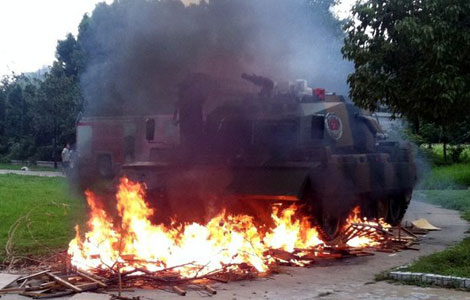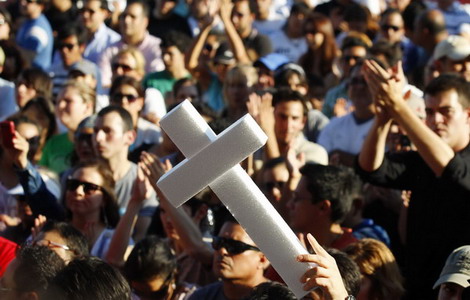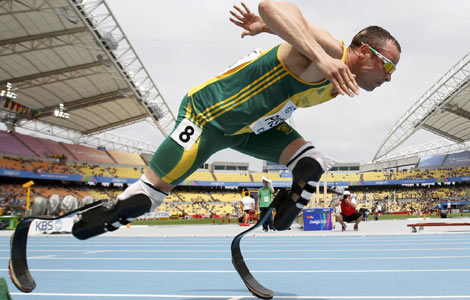Libya's next phase carries risks for US
Updated: 2011-08-23 14:29
(Agencies)
|
|||||||||||
* US wants to help -- not necessarily lead
* Washington working to unlock Gadhafi billions
* Somalia scenarios and US election-year risks
WASHINGTON - US President Barack Obama was a cautious leader in the drive to topple Libya's Muammar Gadhafi and could face even greater risks as Libya embarks on a messy transition to a post-Gadhafi era.
But the United States -- despite deep economic problems and unpopular and costly military commitments in Iraq and Afghanistan -- may yet find itself saddled with an important role in Libya's political reconstruction.
As rebel forces surged into Tripoli and Gadhafi became a hunted man, Obama acknowledged the conflict had reached a "tipping point" but emphasized that what comes next is up to the Libyans.
"This much is clear: the Gadhafi regime is coming to an end, and the future of Libya is in the hands of its people," Obama said in a statement on Monday. He pledged the United States would work with the rebels and its international allies to support a peaceful transition to democracy.
The Pentagon reinforced the cautious message, saying Obama's promise not to commit US troops in the rebel's ground war would also rule out deployments in the aftermath of the battle against Gadhafi.
While it is rich in oil and natural gas, a post-Gadhafi Libya will face a myriad challenges: devastated infrastructure, temptation for revenge killings and no modern history of democratic rule.
One former US diplomat with extensive experience in the Middle East said Libya's complicated tribal and political landscape could unravel in a "Somalia-like scenario", further underlining the need for caution.
"It is not necessarily in the US national interest to assume that mantle of responsibility," he said. "Our recent experience at rebuilding nations in the broader region is not basically a happy one."
He referred to US-led nation-building efforts in Iraq and Afghanistan, where tens of thousands of troops and billions of dollars have brought improvements, but no guarantee of lasting stability.
If Obama's recent actions toward Egypt and Tunisia are any guide, in Libya he will turn to global institutions like the United Nations and the World Bank to lead the reconstruction effort, rather than push the United States out front.
Nevertheless, American officials acknowledged that the United States can lead in certain areas, including political training and logistical and intelligence support for the rebel government as they assesses emergency humanitarian needs.
US Secretary of State Hillary Clinton spoke to both rebel leaders and members of the international coalition on Monday to begin mapping out how the help will be rolled out, State Department spokesperson Victoria Nuland said.
"It's a little premature right now, while the battle for Tripoli continues, to know exactly how that's going to take shape. But we've thinking (and) the (rebel) TNC has been thinking about it for a long time," she said, adding that the United Nations was expected to take the lead.
Nuland said the United States was working to fulfill a rebel request to unlock some $30 billion in Libyan assets frozen after the start of the uprising in February, but that this would still take some time.
TEST OF LEADERSHIP
The White House has been determinedly low-key on Libya, balancing its desire to help anti-Gadhafi rebels and civilians with fear of entanglement in a conflict with no clear end.
Obama joined the Libya intervention only after the U.N. Security Council authorized it. He stressed from the start that he was not committing to a long role in Libya's future.
Since then, the United States has moved with its European and Arab allies, offering technical and diplomatic support to the rebel National Transitional Council but careful not to appear too firmly in the driver's seat.
"This is a situation where the United States probably prefers to take less credit than it deserves," said Robert Danin of the the Council on Foreign Relations. He noted that the administration has never convincingly argued that Libya is a core US security interest.
"This has been an intervention of choice that has not been necessarily particularly popular or resonated with the American people," he said.
Those concerns may grow if Libya spirals into chaos as the United States heads into the 2012 election season. Some Republicans have already painted Libya's next phase as a test of Obama's leadership.
"Ultimately, our intervention in Libya will be judged a success or failure based not on the collapse of the Gadhafi regime, but on the political order that emerges in its place," Republican Senators John McCain and Lindsey Graham said in a statement.
Daniel Serwer, a post-conflict development expert at Johns Hopkins University, said along with concrete assistance the United States should help craft a broader and more specific gameplan for Libya's democratic future.
"It is one thing to write a nice sounding constitutional charter, it's another to patrol the alleyways of Tripoli," Serwer said. "If we want a democratic Libya out of this, it is going to be a 5-to-10 year project. And the US will have to be involved."
(Additional reporting by Arshad Mohammed and Phil Stewart, editing by Warren Strobel and Christopher Wilson)
Hot Topics
The European Central Bank (ECB) held a conference call late on Sunday ahead of the market opening, pledging the ECB will step in to buy eurozone bonds with efforts to forestall the euro zone's debt crisis from spreading.
Editor's Picks

|

|

|

|

|

|





